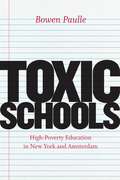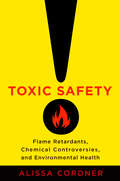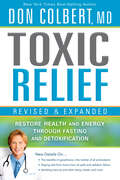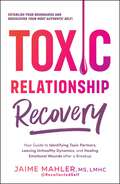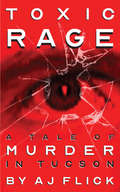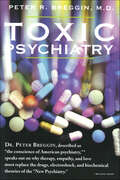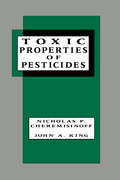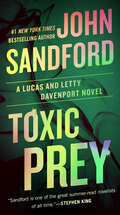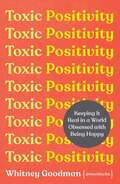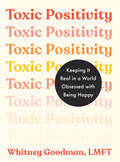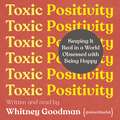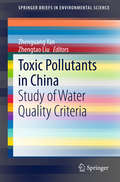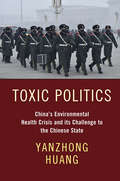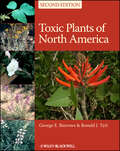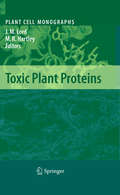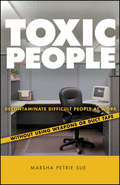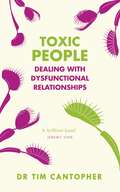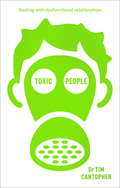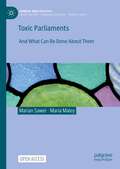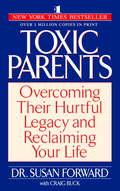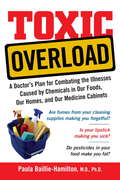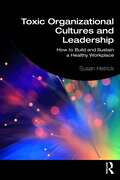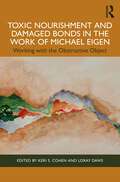- Table View
- List View
Toxic Schools: High-Poverty Education in New York and Amsterdam
by Bowen PaulleViolent urban schools loom large in our culture: for decades they have served as the centerpieces of political campaigns and as window dressing for brutal television shows and movies. Yet unequal access to quality schools remains the single greatest failing of our society--and one of the most hotly debated issues of our time. Of all the usual words used to describe non-selective city schools--segregated, unequal, violent--none comes close to characterizing their systemic dysfunction in high-poverty neighborhoods. The most accurate word is toxic. When Bowen Paulle speaks of toxicity, he speaks of educational worlds dominated by intimidation and anxiety, by ambivalence, degradation, and shame. Based on six years of teaching and research in the South Bronx and in Southeast Amsterdam, Toxic Schools is the first fully participatory ethnographic study of its kind and a searing examination of daily life in two radically different settings. What these schools have in common, however, are not the predictable ideas about race and educational achievement but the tragically similar habituated stress responses of students forced to endure the experience of constant vulnerability. From both sides of the Atlantic Ocean, Paulle paints an intimate portrait of how students and teachers actually cope, in real time, with the chronic stress, peer group dynamics, and subtle power politics of urban educational spaces in the perpetual shadow of aggression.
Toxic Safety: Flame Retardants, Chemical Controversies, and Environmental Health
by Alissa CordnerInitially marketed as a life-saving advancement, flame retardants are now mired in controversy. Some argue data shows the chemicals are unsafe, while others continue to support their use. The tactics of each side have far-reaching consequences for how we interpret new scientific discoveries.An experienced environmental sociologist, Alissa Cordner conducts more than a hundred interviews with activists, scientists, regulators, and industry professionals to isolate the social, scientific, economic, and political forces influencing environmental health policy today. Introducing "strategic science translation," she describes how stakeholders use scientific evidence to support nonscientific goals and construct "conceptual risk formulas" to shape risk assessment and the interpretation of empirical evidence. A revelatory text for public health advocates, Toxic Safety demonstrates that, while all parties interested in health issues use science to support their claims, they do not compete on a level playing field, and even good intentions can have deleterious effects.
Toxic Safety: Flame Retardants, Chemical Controversies, and Environmental Health
by Alissa CordnerInitially marketed as a life-saving advancement, flame retardants are now mired in controversy. Some argue that data show the chemicals are unsafe while others continue to support their use. The tactics of each side have far-reaching consequences for how we interpret new scientific discoveries.An experienced environmental sociologist, Alissa Cordner conducts more than a hundred interviews with activists, scientists, regulators, and industry professionals to isolate the social, scientific, economic, and political forces influencing environmental health policy today. Introducing "strategic science translation," she describes how stakeholders use scientific evidence to support nonscientific goals and construct "conceptual risk formulas" to shape risk assessment and the interpretation of empirical evidence. A revelatory text for public-health advocates, Toxic Safety demonstrates that while all parties interested in health issues use science to support their claims, they do not compete on a level playing field and even good intentions can have deleterious effects.
Toxic Relief, Revised and Expanded: Restore Health and Energy Through Fasting and Detoxification
by Don ColbertWe live in a toxic world. And with new disasters--oil spills, earthquakes, tsunamis, and radioactivity--it is only getting more toxic by the day. You need toxic relief! In this new revised and expanded edition of Toxic Relief, Dr. Don Colbert provides an easy-to-understand and comprehensive explanation of the toxic battle you’re in and a proven program to cleanse your body in just thirty days. Learn about dangerous foods to avoid and healthy substitutions you can make. Detoxify your body with a rotational juice fasting program. Overcome fatigue! Learn how to find the right foods and supplements. Explore the spiritual and physical aspects of fasting. Find out why saunas and exfoliating detox your body. Deep cleansing your body down to the cellular level will renew your vitality, restore your energy, reclaim your health, shed toxic fat, lengthen your life, and give you a healthy glow you haven’t had in years. Brighten your outlook and change your attitude as Dr. Colbert guides you to healthy living--body, mind, and spirit.
Toxic Relationship Recovery: Your Guide to Identifying Toxic Partners, Leaving Unhealthy Dynamics, and Healing Emotional Wounds after a Breakup
by Jaime MahlerLet go of your toxic partner, heal your emotional wounds, and set healthy boundaries for future relationships with this step-by-step guide to overcoming toxic relationships.From red flags to crossed boundaries, to lies and gaslighting, you&’ve recognized that you were or currently are in a toxic relationship. But now what? It&’s time to fully let the relationship go and begin to heal. With Toxic Relationships, you&’ll address the ways that you were wronged during your relationship. You&’ll learn strategies for how to trust other people and yourself again after being gaslit, find the warning signs of toxicity and narcissism in others, and reframe negative, harmful thoughts to a positive outlook on life. As you work to let go of the toxic relationship that ate away at your happiness, you&’ll learn how to carve out space for you to be happy on your own and to love yourself for who you are. When you&’re ready to enter another relationship, you&’ll implement healthy boundaries and clear communication. Put yourself first with Toxic Relationships.
Toxic Rage: A Tale of Murder in Tucson
by AJ FlickAn eye-opening account of the shocking murder that has been featured on 48 Hours, Forensic Files, and Investigation Discovery&’s Killing Time. Brian Stidham fell in love with Tucson, Arizona, the minute he came to town. A young and talented eye surgeon, he accepted a job with an established eye surgeon to take over his pediatric patients. &“It&’s a beautiful place,&” Stidham told a friend. &“I can live right there by the mountains and go hiking. It&’s a great deal for me there. The partner I&’ll be working with is ultracool. He&’s giving me the keys to the kingdom.&” Brad Schwartz, the doctor who hired Brian, was ambitious and possessed surgical skills few others had. But he was a troubled man. Within a year of Stidham&’s arrival in Tucson, the medical relationship would be severed by Schwartz&’s personal troubles. Stidham broke away to start his own practice. Rumors abounded within the medical community that Schwartz was incensed and considered the departure a betrayal. His rage grew, even driving a wedge between him and his fiancée, Lourdes Lopez, a former prosecutor. Three years after Stidham moved to Tucson, his life ended in an empty, darkened parking lot. But who would murder such a nice man in such a violent manner? Lourdes, who had witnessed Schwartz&’s toxic rage toward his former partner, feared she knew. But would her suspicions be enough to catch the killer? Find out in Toxic Rage.
Toxic Psychiatry: Why Therapy, Empathy And Love Must Replace The Drugs, Electroshock, And Biochemical Theories Of The New Psychiatry
by Peter R. BregginProzac, Xanax, Halcion, Haldol, Lithium. These psychiatric drugs--and dozens of other short-term "solutions"--are being prescribed by doctors across the country as a quick antidote to depression, panic disorder, obsessive-compulsive disorder, and other psychiatric problems. But at what cost?In this searing, myth-shattering exposé, psychiatrist Peter R. Breggin, M.D., breaks through the hype and false promises surrounding the "New Psychiatry" and shows how dangerous, even potentially brain-damaging, many of its drugs and treatments are. He asserts that: psychiatric drugs are spreading an epidemic of long-term brain damage; mental "illnesses" like schizophrenia, depression, and anxiety disorder have never been proven to be genetic or even physical in origin, but are under the jurisdiction of medical doctors; millions of schoolchildren, housewives, elderly people, and others are labeled with medical diagnoses and treated with authoritarian interventions, rather than being patiently listened to, understood, and helped.Toxic Psychiatry sounds a passionate, much-needed wake-up call for everyone who plays a part, active or passive, in America's ever-increasing dependence on harmful psychiatric drugs.
Toxic Properties of Pesticides (Environmental Science And Pollution Ser. #12)
by Nicholas P. Cheremisinoff John Allison KingThis work offers concise, detailed information on the toxicological properties of, and safe handling practices for, pesticides. It provides an overview of the registration process, registration procedures and supplemental registration. An alphabetic listing of over 800 chemicals, including their applications - from insecticides and growth regulators to herbicides, repellents and synergists - is provided.
Toxic Prey (A Prey Novel #34)
by John SandfordLucas Davenport and his daughter, Letty, team up to track down a dangerous scientist whose latest project could endanger the entire world, in this latest thriller from #1 New York Times bestselling author John Sandford.Gaia is dying.That, at least, is what Dr. Lionel Scott believes. A renowned expert in tropical and infectious diseases, Scott has witnessed the devastating impact of illness and turmoil at critical scale. Society as it exists is untenable, and the direct link to Earth&’s death spiral; population levels are out of control and people have allowed disarray and disorder to run rampant. While most are concerned about deadly disease, Scott knows that it is truly humanity itself that will destroy Gaia. It&’s only by removing the threat that the planet can continue to prosper, and luckily, Scott is just the right man for the job… When Scott then disappears without a trace, Letty Davenport is tasked with tracking down any and all leads. Scott&’s connections to sensitive research into virus and pathogen spread has multiple national and international organizations on high alert, and his shockingly high clearance levels at various institutions, including the Los Alamos National Laboratory, make him the last person they&’d like to go missing. As the web around Scott becomes more tangled, Letty calls in her father, Lucas, help her lead a group of specialists to find Scott as soon as possible. But as Letty and Lucas begin to uncover startling and disturbing connections between Scott and Gaia conspiracists, their worst fears are confirmed, and it quickly becomes a race to find him before the virus he created becomes the perfect weapon.
Toxic Positivity: Keeping It Real in a World Obsessed with Being Happy
by Whitney Goodman'I really felt like I came away with a new perspective. This book will make you want to bin your gratitude journal in the best possible way' Stylist 'This trailblazing book will help you transform your perspective about positivity' Nedra Glover Tawwab, bestselling author of Set Boundaries, Find Peace'Finally a book that explains exactly why 'positivity at all costs' backfires, and teaches us how to process our pain instead of pretending it doesn't exist.' Caroline Dooner, author of The F*uck It Diet'The counterbalance to a world that preaches 'look on the bright side' whenever life gets tough' Elizabeth Earnshaw, relationship expert and author of I Want This To WorkEvery day, we're bombarded with pressure to be positive. From 'good vibes only' and 'life is good' memes, to endless advice, to 'look on the bright side,' we're constantly told that the key to happiness is silencing negativity wherever it crops up, in ourselves and in others. Even when faced with illness, loss, breakups, and other challenges, there's little space for talking about our real feelings-and processing them so that we can feel better and move forward.But if all this positivity is the answer, why are so many of us anxious, depressed, and burned out?In this refreshingly honest guide, sought-after therapist Whitney Goodman shares the latest research along with everyday examples and client stories that reveal how damaging toxic positivity is to ourselves and our relationships, and presents simple ways to experience and work through difficult emotions. The result is more authenticity, connection, and growth - and ultimately, a path to showing up as you truly are.
Toxic Positivity: Keeping It Real in a World Obsessed with Being Happy
by Whitney GoodmanA powerful guide to owning our emotions—even the difficult ones—in order to show up authentically in the world, from the popular therapist behind the Instagram account @sitwithwhit.Every day, we&’re bombarded with pressure to be positive. From &“good vibes only&” and &“life is good&” memes, to endless advice, to &“look on the bright side,&” we&’re constantly told that the key to happiness is silencing negativity wherever it crops up, in ourselves and in others. Even when faced with illness, loss, breakups, and other challenges, there&’s little space for talking about our real feelings—and processing them so that we can feel better and move forward. But if all this positivity is the answer, why are so many of us anxious, depressed, and burned out? In this refreshingly honest guide, sought-after therapist Whitney Goodman shares the latest research along with everyday examples and client stories that reveal how damaging toxic positivity is to ourselves and our relationships, and presents simple ways to experience and work through difficult emotions. The result is more authenticity, connection, and growth—and ultimately, a path to showing up as you truly are.
Toxic Positivity: Keeping It Real in a World Obsessed with Being Happy
by Whitney Goodman'I really felt like I came away with a new perspective. This book will make you want to bin your gratitude journal in the best possible way' Stylist 'This trailblazing book will help you transform your perspective about positivity' Nedra Glover Tawwab, bestselling author of Set Boundaries, Find Peace'Finally a book that explains exactly why 'positivity at all costs' backfires, and teaches us how to process our pain instead of pretending it doesn't exist.' Caroline Dooner, author of The F*uck It Diet'The counterbalance to a world that preaches 'look on the bright side' whenever life gets tough' Elizabeth Earnshaw, relationship expert and author of I Want This To WorkEvery day, we're bombarded with pressure to be positive. From 'good vibes only' and 'life is good' memes, to endless advice, to 'look on the bright side,' we're constantly told that the key to happiness is silencing negativity wherever it crops up, in ourselves and in others. Even when faced with illness, loss, breakups, and other challenges, there's little space for talking about our real feelings-and processing them so that we can feel better and move forward.But if all this positivity is the answer, why are so many of us anxious, depressed, and burned out?In this refreshingly honest guide, sought-after therapist Whitney Goodman shares the latest research along with everyday examples and client stories that reveal how damaging toxic positivity is to ourselves and our relationships, and presents simple ways to experience and work through difficult emotions. The result is more authenticity, connection, and growth - and ultimately, a path to showing up as you truly are.
Toxic Pollutants in China
by Zhengtao Liu Zhenguang YanThe book presents some of the findings of research into China's water quality criteria for toxic pollutants, including heavy metals, PAHs and emerging pollutant. Water quality criteria (WQC) are the scientific basis for establishing water quality standards (WQSs). For a long time, the study of WQC in China has been neglected, so that almost all of China's WQSs were developed based on foreign WQC. This book provides valuable information for environmental management and revision of WQSs. It has been written for researchers and graduate students in the field of environmental science and risk assessors for chemical and pollutants etc. Dr. Zhen-guang Yan is an Associate Professor at the Chinese Research Academy of Environmental Sciences. Dr. Zhengtao Liu is a Professor at the Chinese Research Academy of Environmental Sciences.
Toxic Politics: China's Environmental Health Crisis and its Challenge to the Chinese State
by Yanzhong HuangEnvironmental degradation in China has not only brought a wider range of diseases and other health consequences than previously understood, it has also taken a heavy toll on Chinese society, the economy, and the legitimacy of the party-state. In Toxic Politics, Yanzhong Huang presents new evidence of China's deepening health crisis and challenges the widespread view that China is winning the war on pollution. Although government leaders are learning, stricter and more centralized policy enforcement measures have not been able to substantially reduce pollution or improve public health. Huang connects this failure to pathologies inherent in the institutional structure of the Chinese party-state, which embeds conflicting incentives for officials and limits the capacity of the state to deliver public goods. Toxic Politics reveals a political system that is remarkably resilient but fundamentally flawed. Huang examines the implications for China's future, both domestically and internationally.
Toxic Plants of North America
by George E. Burrows Ronald J. TyrlToxic Plants of North America, Second Edition is an up-to-date, comprehensive reference for both wild and cultivated toxic plants on the North American continent. In addition to compiling and presenting information about the toxicology and classification of these plants published in the years since the appearance of the first edition, this edition significantly expands coverage of human and wildlife--both free-roaming and captive--intoxications and the roles of secondary compounds and fungal endophytes in plant intoxications.More than 2,700 new literature citations document identification of previously unknown toxicants, mechanisms of intoxication, additional reports of intoxication problems, and significant changes in the classification of plant families and genera and associated changes in plant nomenclature. Toxic Plants of North America, Second Edition is a comprehensive, essential resource for veterinarians, toxicologists, agricultural extension agents, animal scientists, and poison control professionals.
Toxic Plant Proteins
by Martin R. Hartley J. Michael LordMany plants produce enzymes collectively known as ribosome-inactivating proteins (RIPs). RIPs catalyze the removal of an adenine residue from a conserved loop in the large ribosomal RNA. The adenine residue removed by this depurination is crucial for the binding of elongation factors. Ribosomes modified in this way are no longer able to carry out protein synthesis. Most RIPs exist as single polypeptides (Type 1 RIPs) which are largely non-toxic to mammalian cells because they are unable to enter them and thus cannot reach their ribosomal substrate. In some instances, however, the RIP forms part of a heterodimer where its partner polypeptide is a lectin (Type 2 RIPs). These heterodimeric RIPs are able to bind to and enter mammalian cells. Their ability to reach and modify ribosomes in target cells means these proteins are some of the most potently cytotoxic poisons found in nature, and are widely assumed to play a protective role as part of the host plant's defenses. RIPs are able to further damage target cells by inducing apoptosis. In addition, certain plants produce lectins lacking an RIP component but which are also cytotoxic. This book focuses on the structure/function and some potential applications of these toxic plant proteins.
Toxic People: Decontaminate Difficult People at Work Without Using Weapons Or Duct Tape
by Marsha Petrie SuePraise For Toxic People "From corporate America to the smallest business owner, this book should be mandatory reading because it provides toxic relief that will put money in your pocket and calm in your personality. A dose of this reading would enhance the success of business school students and smooth out a few bumps in a rocky marriage." —Richard L. Labrum, Vice President, Wealth Management, Smith Barney "If you're just sick to death of those people who zap the energy right out of you, Marsha has the cure! In no-nonsense terms, she gives us the prescription for dealing with toxic people. She mixes in the right dosage of personal experience, humor, and practical advice to create a compelling message that is highly relevant in our personal and professional lives. I highly recommend this book to everyone interested in cleaning up toxic behaviors!" —John Ryan, Vice President, American Express "Marsha Petrie Sue is the Muhammad Ali of communicators. She can dance and look pretty, and she uses the entire ring, but she knows how and when to land a knockout punch. If you have bad relationships, you'll learn why. This is charm school with live ammunition!" —David Rawles, founder and President, Career Solutions, Inc. "Marsha Petrie Sue's 'take the bull by the horns' approach to self-realization and, if so chosen, self-improvement, is the antidote to today's wimpy leadership malaise. She takes readers by their collars, looks them straight in the eyes, and tells them in no uncertain terms that their key to both personal and professional happiness is attainable only through critical self-evaluation and the will to transcend their current situations." —Randy O'Neill, Senior Vice President, Lancer Insurance Company "She has done it again! She gives us permission to 'sack the toxic people' who suck out our energy. Take Marsha's ticket to freedom: give yourself permission to send the toxic people on their not-so-merry way!" —Dr. Geoff Haw, Consultant, Sagacity Services, Australia "Marsha always finds a way to deliver the most difficult messages in a humorous way (this book is one example). You will be able to apply this book in everyday life and anywhere you encounter people!" —Tina Aguirre, Senior IT Manager, oil and energy company
Toxic People: Dealing With Dysfunctional Relationships
by Tim Cantopher'A brilliant book about how we identify the often-charming people who only spread misery.' Jeremy Vine, BBC Radio 2BMA MEDICAL AWARDS 2020: HIGHLY COMMENDEDSome people are so stressful, they can actually make us ill. Gameplayers, bullies, users and abusers - all pose a risk to our health and welfare if we don't take action. This book presents the tools we need to deal with the toxic people in our lives who drain our energy. It explains how to make healthy relationship choices, set proper boundaries and recognize the red flags that should alert us to avoid certain people. Whether you are struggling with a narcissistic partner, or dealing with a bullying boss or a sociopathic colleague, there is practical advice that will help you not only to protect your mental wellbeing but also to thrive. You will understand the nature of the toxic workplace - how to avoid it and if necessary survive within it. If you're surrounded by the takers of this world, read this book and gain the freedom to make your own choices and live your own life.
Toxic People: Dealing With Dysfunctional Relationships
by Tim CantopherA brilliant book about how we identify the often-charming people who only spread misery.'Jeremy Vine, BBC Radio 2Highly Commended in the BMA Medical Book Awards 2018Some people are so stressful, they can actually make us ill. Gameplayers, bullies, users and abusers ? all pose a risk to our health and welfare if we don?t take action. This book presents the tools we need to deal with the toxic people in our lives who drain our energy. It explains how to make healthy relationship choices, set proper boundaries and recognize the red flags that should alert us to avoid certain people. Topics include:toxic types and how to identify themdangerous people ? aggressors, sadists and psychopathsunderstanding why others behave as they dotoxic familiestoxic places, including where you work how to protect yourselfchoosing your friends carefullyvital principles for coping with toxicityIf you?re surrounded by the takers of this world, read this book and gain the freedom to make your own choices and live your own life.
Toxic People: Dealing With Dysfunctional Relationships
by Tim Cantopher'A brilliant book about how we identify the often-charming people who only spread misery.' Jeremy Vine, BBC Radio 2BMA MEDICAL AWARDS 2020: HIGHLY COMMENDEDSome people are so stressful, they can actually make us ill. Gameplayers, bullies, users and abusers - all pose a risk to our health and welfare if we don't take action. This book presents the tools we need to deal with the toxic people in our lives who drain our energy. It explains how to make healthy relationship choices, set proper boundaries and recognize the red flags that should alert us to avoid certain people. Whether you are struggling with a narcissistic partner, or dealing with a bullying boss or a sociopathic colleague, there is practical advice that will help you not only to protect your mental wellbeing but also to thrive. You will understand the nature of the toxic workplace - how to avoid it and if necessary survive within it. If you're surrounded by the takers of this world, read this book and gain the freedom to make your own choices and live your own life.
Toxic Parliaments: And What Can Be Done About Them (Gender and Politics)
by Marian Sawer Maria MaleyThis open access book shows how the #MeToo movement and revelations of sexual harassment and bullying have spurred on reform of the parliamentary workplace in four Westminster countries – Australia, Canada, New Zealand and the UK. Long-standing conventions included extreme power imbalances between parliamentarians and staff and a lack of professionalised employment practices. Codes of conduct and independent complaints bodies were resisted on grounds of parliamentary privilege: the ballot box was supposedly the best means of holding parliamentarians accountable for their conduct. The taken-for-granted status of adversarial politics and its silencing effects also rendered gendered mistreatment invisible. The authors examine the institutional backdrop and the different trajectories of reform in the four countries, with most detail on the dramatic developments in Australia after angry women marched on parliament houses in 2021. They show how the different parliaments have responded to escalating evidence of misconduct, the role of policy borrowing, and the possibilities of lasting institutional change.
Toxic Parents: Overcoming Their Hurtful Legacy and Reclaiming Your Life
by Susan ForwardBONUS: This edition contains an excerpt from Dr. Susan Forward's Men Who Hate Women and the Women Who Love Them.When you were a child...Did your parents tell you were bad or worthless?Did your parents use physical pain to discipline you?Did you have to take care of your parents because of their problems?Were you frightened of your parents?Did your parents do anything to you that had to be kept secret?Now that you are an adult...Do your parents still treat you as if you were a child?Do you have intense emotional or physical reactions after spending time with your parents?Do your parents control you with threats or guilt?Do they manipulate you with money?Do you feel that no matter what you do, it's never good enough for your parents?In this remarkable self-help guide, Dr. Susan Forward drawn on case histories and the real-life voices of adult children of toxic parents to help you free yourself from the frustrating patterns of your relationship with your parents -- and discover an exciting new world of self-confidence, inner strength, and emotional independence.
Toxic Overload: A Doctor's Plan for Combating the Illnesses Caused by Chemicals in Our Foods, Our Homes, and Our Medicine Cabinets
by Paula Baillie-HamiltonAre fumes from your cleaning supplies making you forgetful? Is your lipstick making you sick? Do pesticides in your food make you fat?<P> "Whether you currently have an illness that you wish to treat, are looking to optimize your existing health, or simply want to lower your changes of becoming ill in the future, this book is designed to help you achieve your health goals." --from the introduction.
Toxic Organizational Cultures and Leadership: How to Build and Sustain a Healthy Workplace
by Susan HetrickToxic organizational cultures and leadership have led to major reputational failures, with the greatest impact felt by the people who dedicate their careers to working for these organizations. And yet organizations do not become toxic overnight. They do not consciously set out to break rules and regulations, nor do they actively seek wrongdoing. This book defines toxic culture, explains how toxic cultures emerge over time, and provides practical approaches supported by in-depth research for overcoming a toxic culture at the individual, team, and organizational level. Pragmatic and applicable, the book provides a call to action that can be applied in any type of organization. While the role of leadership in toxic cultures is acknowledged, the book sets out four distinct stages to embedding toxic cultures and draws on examples from leading organizations and companies to illustrate each stage. The book then identifies interventions and levers that can be implemented by executives, boards, and HR practitioners to prevent toxicity and to change toxic cultures back to healthy, positive workplaces. Drawing on research and interviews with senior HR leaders and executives, the book provides: An understanding of the four stages of toxic cultures and the impact of performance pressures in driving toxicity An appreciation of the role of senior leadership and personality traits Practical tools and guidance on interventions for practitioners to build and sustain a healthy and positive workplace Senior executives, HR, and organizational development practitioners in local and global organizations spanning a range of industry sectors will find this book invaluable. The book is also highly relevant to consultants working in the field of corporate culture and change.
Toxic Nourishment and Damaged Bonds in the Work of Michael Eigen: Working with the Obstructive Object
by Loray Daws Keri S. CohenToxic Nourishment and Damaged Bonds in the Work of Michael Eigen examines Eigen’s rich phenomenological work on the Obstructive Object.The contributors to this collection explore the core theme with reference to key Eigen works, including The Psychotic Core, Psychic Deadness, Toxic Nourishment, and Damaged Bonds. This volume seeks to elaborate on the Obstructive Object through essays and poems that include poignant clinical examples, the impact of exceptionally traumatized patients on their analysts, literature comparisons, and the more "mystical aspect" of Eigen’s influence on working with the obstructive object. Essays draw from Virginia Woolf, Elena Ferrante, Wilfred Bion, D.W. Winnicott, Andrè Greene, Christopher Bollas, and Adam Phillips, among many others, in exploring injury-rage, unwanted patients, psychoanalytic faith, toxic nourishment, and damaged bonds.Toxic Nourishment and Damaged Bonds in the Work of Michael Eigen will greatly interest psychoanalysts, psychotherapists, and those interested in psychoanalytic and spiritual psychology.
